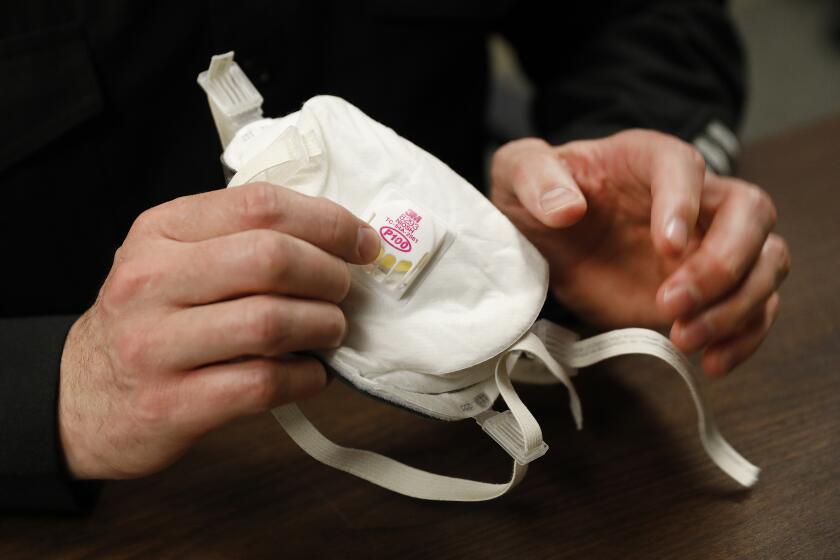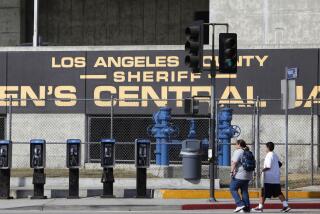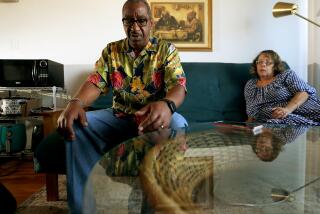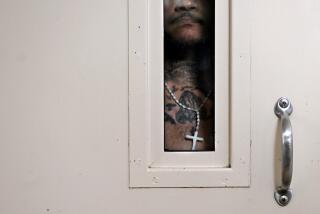L.A. County releasing some inmates from jail to combat coronavirus
- Share via
The Los Angeles County Sheriff’s Department is releasing inmates from its jails and cutting down on how many people it books into custody to protect those housed in close quarters from the growing coronavirus pandemic.
Sheriff Alex Villanueva said deputies and police officers across the county have been directed to cite and release people whenever possible, instead of arresting them, and to seek medical clearance before booking anyone who shows symptoms. Countywide, he said, arrests have dropped from a daily average of 300 to 60, while the jail population was reduced by more than 600 inmates.
“Our population within our jail is a vulnerable population just by virtue of who they are and where they’re located,” Villanueva said Monday at a news conference in downtown L.A. “So we’re protecting that population from potential exposure.”
The move came amid mounting calls by civil rights advocates and health professionals to reduce the number of people held in local, state and federal lock-ups. They raised concerns about the mayhem a COVID-19 outbreak could create within the prison and immigration detention system, which has been criticized for lacking sufficient capacity to meet inmates’ medical needs even before the pandemic.
“It’s too easy to forget about those who are in conditions that will be a powder keg when COVID-19 hits,” said Miriam Krinsky, executive director of the reform group Fair and Just Prosecution who previously headed the Citizens’ Commission on Jail Violence. “What the sheriff identified is a good first step but it can’t be the only thing that we do.”
Chris Beyrer, a Johns Hopkins University epidemiology professor, recalled the case of a 16-year-old Guatemalan in immigration detention who was treated with over-the-counter flu medications, and died the next morning of acute respiratory distress — the same syndrome that makes COVID-19 cases so lethal.
“Nobody should be being detained for not paying a parking fee or because they are poor and can’t make bail,” Beyrer said. “We need to be releasing those people yesterday.”
California suspended visitation in state prisons Wednesday, and over the weekend broadened that to include overnight family visits. Sheriff’s officials in Los Angeles and Orange counties followed suit.
San Quentin State Prison has put some 1,800 inmates in quarantine after reports of flu-like illnesses within two cell blocks. One of those is the reception unit where new prisoners arrive from jail.
Prison officials said no inmates have tested positive for COVID-19, but also confirmed that for most inmates, the department’s new protocol requires the results of a flu test to be obtained first, and if that is negative, there is a potential four-day wait for coronavirus results. However, the policy directs that prisoners 65 or older or those with chronic medical conditions should be considered for immediate COVID-19 testing.
The Alameda County public defender last week formally asked local prosecutors and law enforcement agencies to shield some 300 medically at-risk jail inmates from virus exposure with a combination of early releases and pre-trial diversion programs. He also asked judges to suspend the practice of issuing bench warrants for the arrest of clients who don’t make their court dates.
“We are in unprecedented territory and in order to protect our community, we are asking for the appropriate authorities to take unusual actions,” Public Defender Brendon Woods wrote.
If doctors and nurses don’t have masks, all the toilet paper and pasta in the world won’t save you.
In Los Angeles County, deputies began screening new inmates at its two intake centers — the Inmate Reception Center and the Century Regional Detention Facility — nearly two weeks ago.
Before entering the building, inmates were asked if they’ve left the country recently or contacted anyone who has, and whether they have a fever or any other symptoms, Capt. Tania Plunkett said last week.
A yes answer to any of those questions triggered another set of questions, and a medical professional would respond to the parking lot to evaluate the inmate. Depending on the outcome, the inmate would either be processed into the jail or sent to a medical center.
Although there are no confirmed cases of the virus in the jails, Villanueva said 21 inmates are quarantined at Men’s Central Jail, five are quarantined at Twin Towers Correctional Facility, and nine inmates are in isolation at the Correctional Treatment Center. It was unclear how many of them, if any, have been tested for the coronavirus.
“All of them are receiving the necessary level of care,” Villanueva said.
He said that since Feb. 28, the Sheriff’s Department had reduced the jail population to 16,459 inmates, including through the early release of inmates who had less than 30 days of jail time left to serve.
Deputies may now cite and release anyone whose total bail would amount to less than $50,000. “We’ve raised it from $25,000 to $50,000,” Villanueva said. “Another way we’re reducing the population.”
Civil rights advocates last week called for the Sheriff’s Department to speed up the release of inmates with 30 days or less left of their sentences and to assess vulnerable inmates, including those who are elderly or have an underlying health condition, for immediate release.
“People in jails are highly vulnerable to outbreaks of contagious illnesses,” the American Civil Liberties Union of Southern California said last week in a letter to Villanueva. The organization said it had scheduled a meeting with the Sheriff’s Department on Friday.
“Restrictive responses, such as lock-downs, would worsen the conditions for those inside, putting their health and safety at risk,” the ACLU wrote. “The only meaningful way to keep people inside and outside of the jails safe from COVID-19 is to decrease the total number of people who are incarcerated.”
Ricardo Garcia, the public defender of Los Angeles County, said in an interview Monday that among his top priorities was to keep people out of custody. He said he asked for a review of people who are particularly vulnerable to determine those who can be released under safe circumstances.
“We don’t want individuals who are particularly vulnerable who are homeless to be let out of jail onto the streets again,” he said.
He noted that the governor has called on those 65 and older to exercise caution and consider separating themselves.
“People over 65 in jail aren’t able to do that,” Garcia said.
Times staff writer Noah Bierman contributed to this report.
More to Read
Sign up for Essential California
The most important California stories and recommendations in your inbox every morning.
You may occasionally receive promotional content from the Los Angeles Times.














